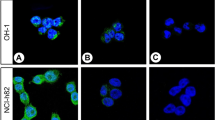Play all audios:

A variety of normal and transformed avian and mammalian cells and tissues contain high affinity specific receptors on their membranes which interact with biologically active phorbol and
ingenol esters in a reversible and saturable manner. The binding of labelled phorbol-12,13-dibutyrate (PDBu) to live or glutaraldehyde-fixed cells is dose-, time- and temperature-dependent.
Those phorbol or ingenol esters which stimulate cell growth in culture and have tumour-promoting activity in vivo inhibit the binding of labelled PDBu, while the biologically inactive
derivatives fail to do so. Other non-diterpene tumour-promoting agents, epidermal growth factor (EGF), retinoids and prostaglandins do not compete for the binding of labelled PDBu to its
specific membrane receptors.
Anyone you share the following link with will be able to read this content:
